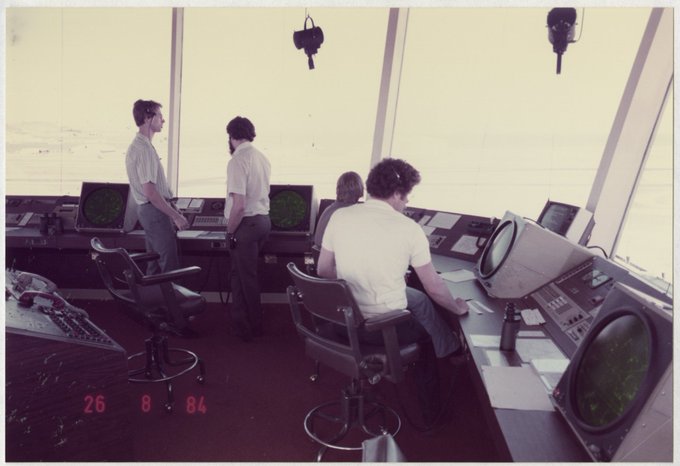 |
| ATC today |
Air traffic controllers ensure that all flights are executed in a safe manner (i.e prevent collisions), maintain a good flow of traffic, and keeping constant contact with airplanes in their airspace. Controllers usually operate from passing the monitoring of aircraft from one to another: Ground will direct aircraft on taxiways, passing off to Tower which operates active runways and takeoffs/landings, which then direct the aircraft to contact Approach who handle aircraft in the airport vicinity, and finally en route controllers will direct the aircraft once it has reached cruising altitude.
Controlling air traffic is a very demanding and requires constant attention and focus. A study done by the Federal Aviation Administration (FAA) showed that many controllers were overall very dissatisfied with their work: working conditions consisted of poorly ventilated rooms and required monitoring of small-screened radars and screens, and often included poor worker-manager relations due to the stress of the situation. Working rotating shifts, controllers would punch out at 11pm only to return to work at 7am the next morning. Many controllers agreed that their grievances weren’t over money, but over working conditions, and long hours.
 |
| You bet those windows weren't cracked open |
The Professional Air Traffic Controller Organization trade union (PATCO) voiced these grievances to the FAA and government, who in turn gave little heed to the controllers, basically saying that other jobs have stress too. PATCO opened negotiations with the FAA, threatening to strike.
PATCO focused it’s demands on monetary benefits, for that would be easier to gain than focusing on attaining admittance on the failure of establishing good working conditions for controllers. PATCO asked for an annual increase of $10,000 (annual pay rate for controllers at the time was $20,000 to $49,000), reduction to a four-day/32 hour workweek from the five-day/40 hour, and better benefits package for retirement. Their offer was countered by the FAA with $40 million dollars for pay increase (that would give ATC controllers the pay rate twice that of what other government agencies had on average), however PATCO was asking for a cumulative $681 million dollars package for air traffic controllers. Not given that sum, and not given retirement benefits, PATCO declared a strike on August 3rd, 1981. Around 13,000 air traffic controllers walked off the job, grounding near 7,000 flights.
 |
The PATCO union was one of the only unions to support Reagan in his campaign, but Reagan did not support them in this strike. Air traffic controllers are considered federal workers, and a 1955 law makes striking of federal workers illegal. While Reagan pledged his support in the right of private sector workers to strike, he believed federal workers cannot have the same privilege due to the impact their absence would cause on the country. He gave PATCO strikers a 48 hour ultimatum and threatened to fire all strikers who wouldn’t return to the job. Additionally, to the chagrin of the strikers, the unified force of non-striking controllers, supervisors, and military personnel were able to get 80% of flights back into the air, virtually eradicating the effect of the strike. However, PATCO did not back down, calling his bluff.

Reagan carried out his threat. On August 5th he fired over 11,000 controllers from their job, and furthermore imposed a life ban on working ATC for those workers (the ban was later lifted in ‘93 by President Clinton).
This strike had some long term consequences on the American workforce as a whole. Prior to this strike, it was not acceptable for employers to replace striking workers, but after the President has done it, that fact became a strong psychological threat to workers, dramatically decreasing the amount of union strikes since ‘81. The air traffic controller strike virtually took away striking as a powerful weapon against inadequate job management in America.
https://www.npr.org/2006/08/03/5604656/1981-strike-leaves-legacy-for-american-workers
https://www.politico.com/story/2017/08/05/reagan-fires-11-000-striking-air-traffic-controllers-aug-5-1981-241252
https://millercenter.org/reagan-vs-air-traffic-controllers
https://scholar.smu.edu/cgi/viewcontent.cgi?article=2338&context=jalc
No comments:
Post a Comment
Note: Only a member of this blog may post a comment.